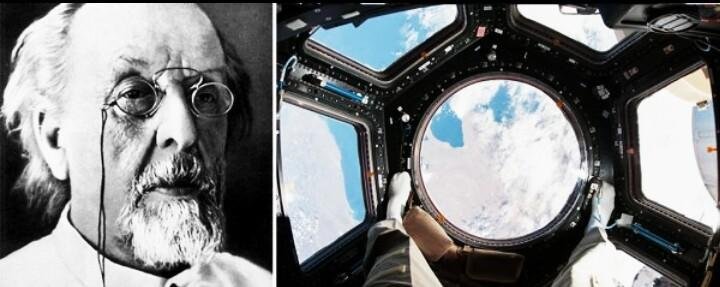
In the early years of the 20th century a Russian scientist – now called the father of astronautics and rocketry – wrote a fable exploring what lifestyles in space is probably like inside the future.
Konstantin Tsiolkovsky (1857-1935) advised that, via 2017, conflict and war might be eliminated by means of a global government. He additionally proposed this as the yr humanity might accumulate the technology to journey beyond the Earth.
it truly is 60 years after this happened in reality. So now that 2017 has been and gone, just how accurate have been his different predictions?
What makes Tsiolkovsky's story – later posted in English in 1960 as outdoor the Earth – so interesting is that he assembled a fictional dream group of the finest clinical minds from the sixteenth to 20th centuries to build a rocket able to achieving orbit.
The scientists blanketed Galileo Galilei (1564-1642), Isaac Newton (1642-1727) and Tsiolkovsky himself (below the pseudonym of Ivanov).
using the voice of those legends of technology, Tsiolkovsky described no longer most effective the practical components, but also the sensations and emotions of residing in area. it's an fantastic feat of the creativeness.
allow's examine how Tsiolkovsky's concept experiment shapes up towards reality.
Tsiolkovsky concept for a spacecraft from 1883.
A rocket's eye view
seen from orbit, space guests are frequently struck by means of the beauty and fragility of the Earth and experience a cognitive shift of consciousness. that is known as the assessment impact and has been pronounced by using astronauts and cosmonauts because the 1960s.
Tsiolkovsky expected this. In outside the Earth, Newton warns the rocket crew that they may locate the sight of the Earth overwhelming; and indeed there are combined reactions:
The guys have been bowled over through the sight, some felt exhausted and moved faraway from the portholes […] Others, however, darted excitedly from porthole to porthole with cries of wonder and pleasure.
What they don't enjoy, however, is any other issue of the overview impact: the realisation that country wide borders and terrestrial conflicts are in the long run meaningless.
possibly this is because our fictional cosmonauts are already dwelling in a unified, peaceful international, some thing very far from in which we're today.
In space, anybody is same
Tsiolkovsky believed that the absence of gravity might erase social lessons and sell equality.
In orbit, power from the sun is abundant and loose. Little attempt is needed to move heavy hundreds, so construction is reasonably-priced. garb is senseless because temperature may be without problems regulated to a balmy 30 to 35 stages Celsius. Beds and quilts are a thing of the past.
there's now not any difference among the sources to be had to rich and poor – all of us can stay in a elaborate microgravity palace in the event that they want.
As attractive as this imaginative and prescient is, in reality space tour remains the maintain of the very rich, whether or not individuals or nations. If anything, we hazard differential get entry to to area assets growing, instead of eroding, inequality on this planet.
The orbital diaspora
once our fictional explorers have efficiently tested their rocket, they share the era with all of us who wants to migrate to area.
hundreds of rockets are launched into geostationary orbit – the place where most of our telecommunications satellites are today, about 35,000 km above the Earth.
The colonists construct orbital greenhouse habitats. every is a cylinder 1,000×10 metres, housing 100 human beings. A soil-filled pipe runs via the centre, supporting a luxuriant ecosystem of fruit, veggies and flora.
with out seasons, weeds or pests, there is abundant meals for our vegetarian colonists all yr round.
In reality, human beings started dwelling in orbit a long way earlier than Tsiolkovsky predicted. the primary space station, Salyut 1, become released in 1971.
The global area Station has been completely occupied in low Earth orbit for the beyond 17 years. however there's no orbiting ring of habitats in which human beings can get away the hardships of lifestyles on the earth.
We now recognise that microgravity has severe outcomes on the human frame, together with lack of bone density and impaired imaginative and prescient. dwelling in area additionally manner publicity to risky degrees of radiation.
anyhow, the value of space journey is prohibitive for all but a tiny part of the Earth's populace.
Mining the sun gadget
Of path, assets are had to hold the orbital life described through Tsiolkovsky.
Newton and his team discover ways to capture meteors and locate that they contain an abundance of beneficial minerals: iron, nickel, silica, alumina, feldspar, numerous oxides, graphite and lots extra.
From these minerals, Newton says, constructing materials, oxygen for respiration, soil for vegetation and even water may be extracted.
Tsiolkovsky become right about the importance of off-Earth mining for destiny space economies. right here his prediction and actual life are more aligned.
However while governments, private businesses and researchers are pursuing the riches promised by means of the Moon and asteroids, there may be a long manner to go before the generation is same to the challenge.
Leaving the cradle of Earth
A hundred years in the past, Tsiolkovsky imagined that lifestyles in space could create an idyllic egalitarian society in which human beings basked in orbiting greenhouses, ingesting in the endless energy of the sun.
as an alternative, the wreckage of rockets and satellites orbits the Earth, splintering into ever smaller fragments that reflect the plastics proliferating in the oceans.
As area-for-income competes with area as the commonplace history of humanity, it's well worth remembering that there are alternative visions of the destiny of human society, other worlds that we will aspire to.
in a single element we've got a ways surpassed Tsiolkovsky's vision. At the realization of out of doors the Earth, his cosmonaut-scientists talk of touring from Mercury to the earrings of Saturn.